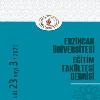Yabancı Dil Sınıflarında Konuşma Doğruluğunu ve AkıcılığınıArttırma: İngilizce Konuşma SınıflarınaYakın Bir Bakış*
özerklik-destekleyici ortam, İngilizce konuşma, motivasyon, doğruluk, akıcılık.
Promoting Speaking Accuracy and Fluency in Foreign Language Classroom: A Closer Look at English Speaking Classrooms*
Autonomy-supportive climate, English speaking, motivation, accuracy, fluency.,
___
- Black, A. E., & Deci, E. L. (2000). The effects of instructors’ autonomy support and students’ autonomous motivation on learning organic chemistry: A self- determination theory perspective. Science Education, 84, 740-756.
- Boonkit, K. (2010). Enhancing the development of speaking skills for non-native speakers of English. Procedia Social and Behavioral Sciences, 2, 1305–1309.
- Chelle de Porto, B. (1997). Developing speaking skills by creating our own simulations for the EFL Courses, Forum, 35(3), 51.
- Dinçer, A. (2011). Turkish EFL speaking course students’ motivational orientations and their instructors’ autonomy support (Unpublished master’s thesis). Atatürk University, Erzurum.
- Dinçer, A., Yeşilyurt, S., & Göksu, A. (2010). Practical tips on how to promote learner
- autonomy in foreign language classrooms. Paper presented at the 10th International Language, Literature and Stylistics Symposium, Gazi University, Ankara, pp. 428- 433.
- Huang, L. (2010). Methods to oral English practice. Asian Social Science, 6(6), 187-
- -
- Kayi, H. (2006, November). Teaching speaking: Activities to promote speaking in a second language. The Internet TESL Journal, XII(11). Retrieved September 01, 2011 from http://iteslj.org/Techniques/Kayi-TeachingSpeaking.html.
- Khan, N., & Ali, A. (2010). Improving the speaking ability in English: The students’ perspective. Procedia Social and Behavioral Sciences, 2, 3575–3579.
- Klancar, N. I. (2006, November). Developing speaking skills in the young learners’ classroom. The Internet TESL Journal, XII(11). Retrieved August 15, 2011 from http://iteslj.org/Techniques/Klancar-Speaking Skills.html.
- Larsen-Freeman, D. (2000). Techniques and principles in language teaching (2nd ed.). Oxford: Oxford University Press.
- Martinez-Flor, A., Uso-Juan, E., & Soler, E. A. (2006). Towards acquiring communicative competence through speaking. In E. Uso-Juan & A. Martinez-Flor (Eds.), Current trends in the development and teaching of the four language skills (pp.139-159). The Hague: Mouton De Gruyter.
- Mckay, S. L. (2002). Teaching English as an international language. NY: Oxford
- University Press.
- Meng, X., & Wang, Q. (2006). Psychological factors and teachers’ language. US - China Education Review, 4 (5), 70-74.
- Nunan, D. (2003). Practical English language teaching. NY: McGraw-Hill.
- Oxford, R. L. (1990). Language learning strategies: What every teacher should know. New York: Newbury House Publishers.
- Reeve, J. (2006). Teachers as facilitators: What autonomy-supportive teachers do and why their students benefit. The Elementary School Journal, 106(3), 225- 236.
- Reeve, J., & Jang, H. (2006). What teachers say and do to support students’ autonomy during a learning activity. Journal of Educational Psychology, 98,
- -218.
- Ryan, R. M., & Deci, E. L. (2002). An overview of self-determination theory. In E.
- L. Deci & R. M. Ryan (Eds.), Handbook of self-determination research (pp. 3-33). Rochester, NY: University of Rochester Press.
- Shumin, K. (1997). Factors to consider: Developing adult EFL students’ speaking abilities. Forum, 35(3), 8-18.
- Songsiri, M. (2007). An action research study of promoting students’ confidence in speaking English (Unpublished Ph.D. dissertation). Victoria University, Australia.
- Wang, L. (2005). Perceptions of Chinese college students’ motivations for learning oral English. Sino- Us English Teaching, 2(11), 64-69.
- Willerman, B. (2011). Teaching speaking: From accuracy vs. fluency to accuracy plus fluency. Retrieved September 10, 2011 from http://www.geocities.co.jp/CollegeLife/9546/papers/paper2.htm.
- Wolff, M. (2010). China’s English mystery – the views of a China ‘foreign expert’.
- English Today, 26(4), 53-56.
- Xia-Hua, H. (1985). Chinese EFL students’ learning strategies for oral communication. TESOL Quarterly, 19(1), 167-168.
- Xian-Long, F. (2009). Problems and strategies for Chinese English major students’ oral skills development. US-China Foreign Language, 7(8), 27-35.
- Zehr, M. A. (2010). Oral-language skills for English-learners focus of researchers.
- Austin, TX: Education Week, 29(8).
- Zhang, Y. (2009). Reading to speak: Integrating oral communication skills. English Teaching Forum, 1(1), 32-34.
- Zhang, X., & Head, K. (2009). Dealing with learner reticence in the speaking class.
- ELT Journal, 64(1), 1-9.
- Yayın Aralığı: Yılda 4 Sayı
- Başlangıç: 1999
- Yayıncı: Erzincan Binali Yıldırım Üniversitesi
Üniversite Öğrencilerinde Patolojik Endişeyi Yordayan Demografik ve Psikolojik Özellikler
Öğretmen Adaylarinin İletişim Becerileri ile Sınıf Yönetimi Becerilerinin İncelenmesi
Nusrettin YILMAZ, Seda ALTUNBAŞ
Hava İPEK AKBULUT, Hakan Şevki AYVACI
Türk Geç Ergenlerde Beş Faktör Kişilik Boyutlarının Ergenlerin Benlik Saygılarıyla Yordanması
Ramazan DİKİCİ, Gürsel GÜLER, Ercan ÖZDEMİR
Ali DİNÇER, Savaş YEŞİLYURT, Ali GÖKSU
Kimya Öğretmen Adaylarının Kaynama Olayı İle İlgili Anlayışları: Bir Olgubilim Çalışması
Tacettin PINARBAŞI, Nurtaç CANPOLAT
İlköğretim Matematik Dersi Öğretim Programı ve Uygulanmasına Yönelik Öğretmen Görüşleri
Gürsel GÜLER, Ercan ÖZDEMİR, Ramazan DİKİCİ
Sanat Eğitimi Alan ve Almayan Lise Öğrencilerinin Erdem Etiği Düzeyleri Üzerine Bir Araştırma
